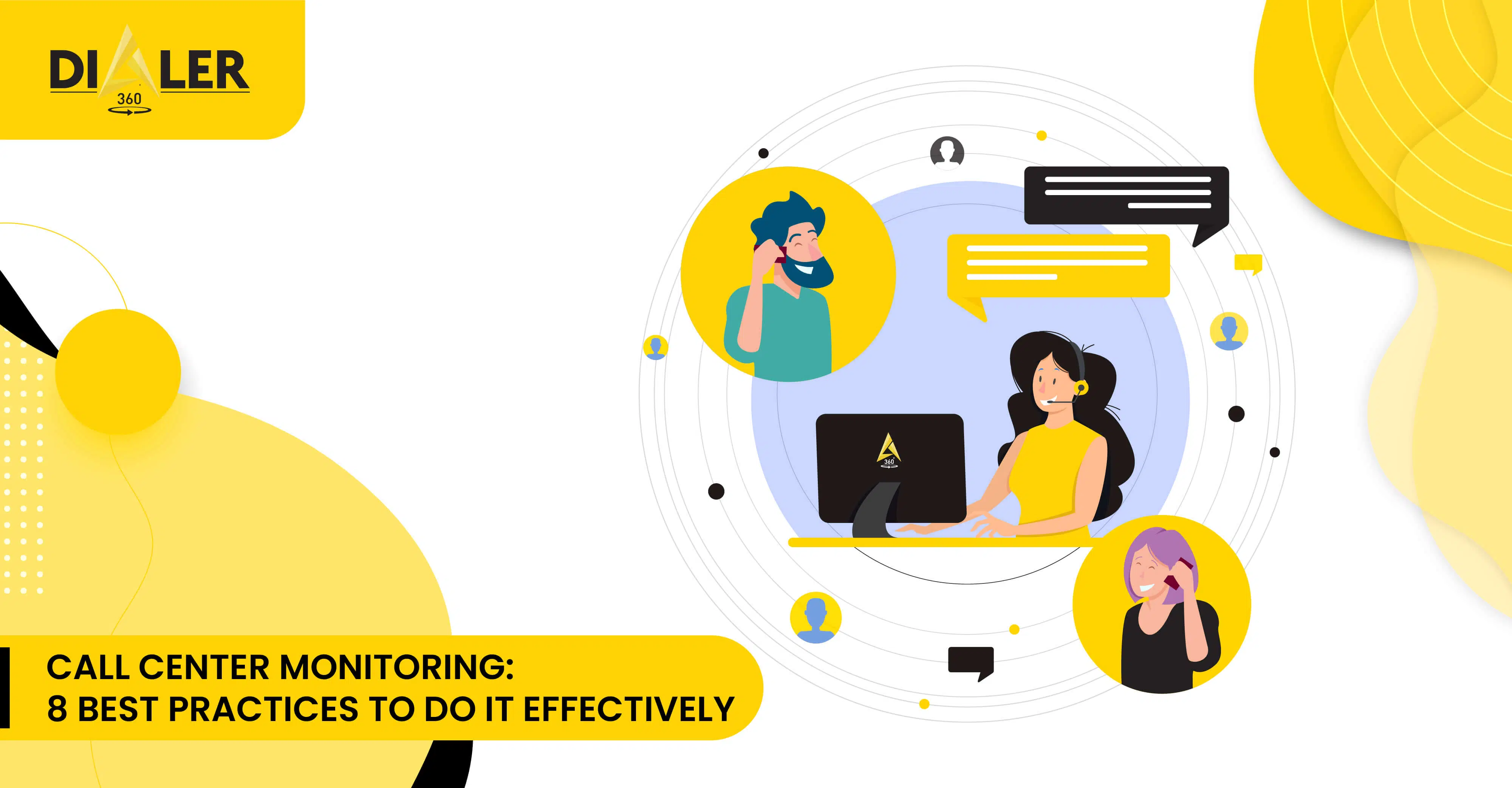Call center monitoring is implemented in the call centers to improve the agent’s performance and customer satisfaction. The goal is to measure all standards that play a great role in quality calls and correct these if don’t work properly. However, when a call quality program is conducted, call center managers try to find an accurate picture of the interaction between customers and staff. So, the right way of monitoring helps your business to work smoothly and increase customer satisfaction rate.
What is call center monitoring?
When running a call center, you need to make sure that your agents are providing the best possible service to your customers. To do this, you need to have a system in place to monitor their calls. This system is known as call center monitoring. Call center monitoring can help you identify problems with your agents’ performance and make changes to improve the quality of your customer service. This is the process of recording and analyzing call center metrics to improve performance. Call center metrics can include things like call volume, average call time, abandon rate, or first call resolution rate. By analyzing these metrics, call center managers can identify problems and take steps to improve performance.
Different types of call center monitoring
There are two types of call center monitoring that are quality assurance and performance.
Quality Assurance:
Quality assurance monitoring is a process to measure customer satisfaction and employee performance at the same time. Measure the call quality metrics according to the standards of your company. Assess calls and give employees feedback on how they can perform. After all, it is the first point of contact between the company and its customers. To ensure that calls are handled properly and efficiently, businesses need to have a robust quality assurance (QA) process in place. There are many different aspects to consider when setting up a QA process, but some of the most important elements include call monitoring, recording, and analysis.
Performance monitoring:
Performance monitoring measures the agent’s performance based on their work such as call contact rate, abandonment calls, and resolving how many issues on first call resolution. By employing performance monitoring effectively, measure some metrics:
- Average talk time
- Hold time
- Average call length
- Work time
- Number of received calls
By measuring the above metrics, you can improve business productivity and efficiency by identifying the need for training. If your employees take too much time to handle one call then they need to train them. Schedule training and give some tips to handle calls in less time. Both types of call center monitoring are important for impactful results and your business’s success. Furthermore, this is important to improve call center performance at many levels by measuring the interaction between customers and employees. Let’s discuss some practices for quality call monitoring.
8 best practices for effective call monitoring
There is no doubt that every call center must dive deep into each call to gain detailed insight that can be analyzed, interpreted, shared, and acted upon. Here are some practices for effective call monitoring:
Develop call monitoring strategies from the initial phase
Monitor call center performance on day one because identifying the problems initially and resolving these as soon as possible doesn’t affect the business result. If your business running a long time without monitoring then you receive customer complaints suddenly and it is difficult to resolve all issues immediately. So, start monitoring on day one and fix all issues initially and run the business smoothly.
Set clear goals
Define your goals that are realistic, and achievable, and later work on them because working to achieve an aim is necessary for a successful business. Determine goals as well as understand why you start monitoring. Do you want to improve customer service? Clarify all these things and conduct a meeting to aware your employees of these goals. Because every team member knows about your call center goals and works accordingly.
Define what are successful calls
Understand components of successful calls if you are a call center manager. Know about call scripts and different scenarios of customer service that agents will come across. Moreover, know well about your company products and services as well as competitors. In this way, you can handle your customer queries more efficiently and represent your brand in the best way. Include some components to make your call successful:
- Speak in a positive tone
- Clarify customer concerns
- Active listening
- Offering solutions that meet the customer’s needs
- Handle objections
- Attempt to close positively
Implement right tools
Call center monitoring sounds easy but it is tricky sometimes. Without using the right tools, you are not capable to monitor your calls effectively and you are frustrated by putting too much effort. So, find the right tool that is compatible with your infrastructure as well as train your employees on how to use the system and interpret the data.
Analyze call recording
An important factor of call center metrics is analyzing the call recording. Review call recording of both good and bad calls daily because this gives insights into your employee performance. Other than that, analyze recordings and know all factors where your employees need training. You can note some things during the review that are:
- Agents don’t give helpful information
- Don’t follow call scripts
- Inconsistency of proper grammar
- Aggressive calls
Check your call analytics
The modern business world is more competitive than ever before. To succeed, you need to be able to make decisions quickly and efficiently. Check call analytics can help you do just that. By tracking and analyzing your calls, you can see what’s working and what’s not. You can also identify patterns and trends that can help you make better decisions in the future.
Implement agent training
Agents are the most significant element of the call center monitoring process. They are helpful to generate data as well as deliver desired results. After the process of call monitoring schedule, training and provide your team with detailed tricks and strategies that improve customer service. Revealing areas of improvement after that training your agents systematically improve the business productivity and drives more ROI.
Give feedback
Feedback is an essential part of any healthy relationship, whether it be personal or professional. It allows us to communicate our needs and wants, and it allows us to grow and improve. So, give feedback to your agents to encourage them as well as they find their inefficiencies and struggle to improve them.
How can call center monitoring help your business?
In today’s competitive business world, call center monitoring can be a valuable tool to help your company improve its customer service. By tracking and recording calls, you can identify areas where your employees need more training or where your scripts need to be revised. Call center monitoring can also help you assess the quality of your employees’ work and identify top performers. This can help you ensure that your customers are satisfied and that your employees are working properly. Here are some of the benefits:
- Identifying problems quickly
- Focus on training efforts
- Improve customer service
- Reduce employee turnover
To wrap things up
In conclusion, call center monitoring is a critical aspect of any business. It helps to ensure that customers are satisfied with the service they receive and that employees are held accountable for their performance. By implementing a call center monitoring system, businesses can improve customer satisfaction and decrease operating costs. Dialer360 call center software helps your agents to monitor customers with a real-time dashboard.





